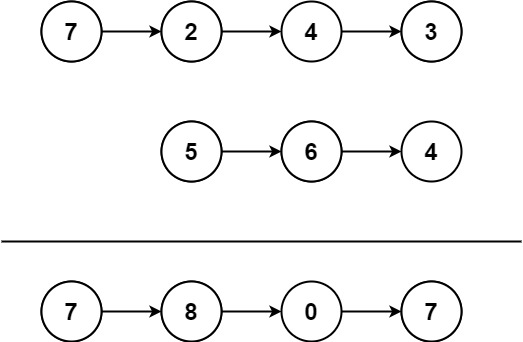Description
You are given two non-empty linked lists representing two non-negative integers. The most significant digit comes first and each of their nodes contains a single digit. Add the two numbers and return the sum as a linked list.
You may assume the two numbers do not contain any leading zero, except the number 0 itself.
Example 1:

Input: l1 = [7,2,4,3], l2 = [5,6,4] Output: [7,8,0,7]
Example 2:
Input: l1 = [2,4,3], l2 = [5,6,4] Output: [8,0,7]
Example 3:
Input: l1 = [0], l2 = [0] Output: [0]
Constraints:
- The number of nodes in each linked list is in the range
[1, 100]. 0 <= Node.val <= 9- It is guaranteed that the list represents a number that does not have leading zeros.
Follow up: Could you solve it without reversing the input lists?
Solution
Python3
# Definition for singly-linked list.
# class ListNode:
# def __init__(self, val=0, next=None):
# self.val = val
# self.next = next
class Solution:
def addTwoNumbers(self, l1: Optional[ListNode], l2: Optional[ListNode]) -> Optional[ListNode]:
def reverseLL(head):
prev = None
while head:
nxt = head.next
head.next = prev
prev = head
head = nxt
return prev
l1 = reverseLL(l1)
l2 = reverseLL(l2)
prev = None
carry = 0
while l1 or l2 or carry > 0:
if l1:
carry += l1.val
l1 = l1.next
if l2:
carry += l2.val
l2 = l2.next
node = ListNode(carry % 10)
node.next = prev
prev = node
carry //= 10
return prev